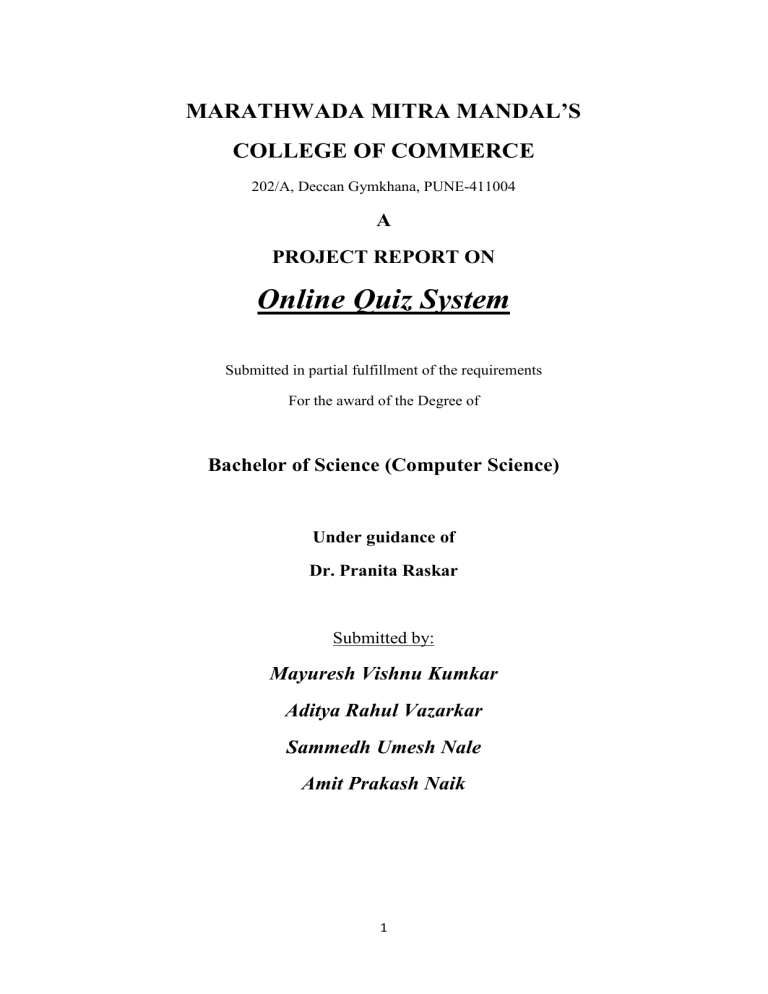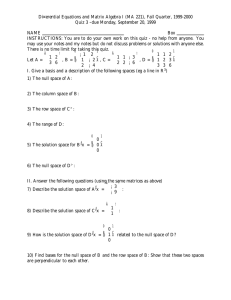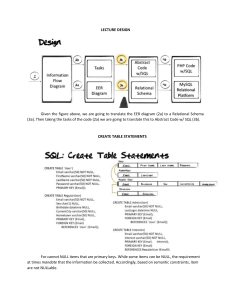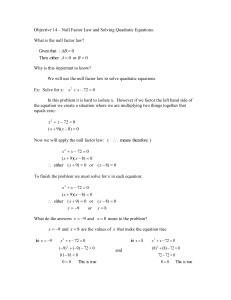
MARATHWADA MITRA MANDAL’S COLLEGE OF COMMERCE 202/A, Deccan Gymkhana, PUNE-411004 A PROJECT REPORT ON Online Quiz System Submitted in partial fulfillment of the requirements For the award of the Degree of Bachelor of Science (Computer Science) Under guidance of Dr. Pranita Raskar Submitted by: Mayuresh Vishnu Kumkar Aditya Rahul Vazarkar Sammedh Umesh Nale Amit Prakash Naik 1 SAVITRIBAI PHULE PUNE UNIVERSITY (2019-2020) MARATHWADA MITRA MANDAL’S COLLEGE Bachelor of Business Administration(Computer Application) 302/A, Deccan Gymkhana, PUNE-411004 CERTIFICATE This is to certify that Mayuresh Vishnu Kumkar Aditya Rahul Vazarkar Sammedh Umesh Nale Amit Prakash Naik Have completed the project entitled ‘Online Quiz System’ in a partial fulfillment for the award of Bachelor of Science (Computer Science) Savitribai Phule Pune University Academic Year 2019-2020 Internal Examiner Examiner External Dr. Pranita Raskar Dr. Anpat S.M Project Guide HOD 2 INDEX SR.NO 1 PARTICULARS PAGE NO INTRODUCTION 1.1 INTRODUCTION TO SYSTEM 1.2 SCOPE OF SYSTEM 1.3 PROPOSE SYSTEM 2 SYSTEM ANALYSIS 2.1 FACT FINDING TECHNIQUE 2.2 FEASIBILITY STUDY 3 REQUIREMENT SPECIFICATION 3.1 HARDWARE REQUIREMENTS 3.2 SOFTWARE REQUIREMENTS 4 SYSTEM DESIGN 4.1 E-R DIAGRAM 4.2 CONTEXT LEVEL DIAGRAM 4.3 UML DIAGRAM 4.4 FILE DESIGN 4.5 DATA DICTIONARY 5 EXPERIMENT DETAILS 6 RESULT 7 LIMITATIONS 8 CONCLUSION 9 FUTURE ENHANCEMENT 3 ACKNOWLEDGEMENT I express my sincere thanks to sir Dr Devidas Golhar, Principal of, MARATHWADA MITRA MANDAL COLLEGE OF COMMERCE (MMCC). I pay my deep sense of gratitude to Dr. Sandip Anpat, Head of Department, Department of Computer Science, to encourage us to the highest peak and to provide us the opportunity to prepare the project. I feel to acknowledge my indebtedness and deep sense of gratitude to our guide Dr. Pranita Raskar, Faculty of Computer Science, whose valuable guidance and kind supervision given to us throughout the course which shaped the present work as its show. 4 1. INTRODUCTION: - 1.1 INTRODUCTION TO SYSTEM Online quiz examinations content provides to focus on creating effective assessment questions and focusing on exam’s feedback delivery to students. In the paper we present techniques that are pertinent to the elements of assessment process: answers submission, computerized grading, and feedback after submission. As the modern organizations are automated and computers are working as per the instructions, it becomes essential for the coordination of human beings, commodity and computers in a modern organization. The administrators, instructor, students who are attending for online quiz examination can communicate with the system through these projects, thus facilitating effective implementation and monitoring of various activities of Online Quiz Examinations like conducting Exams as per scheduled basis and delivering result to that particular user or student, and the details of students who attempted Online Quiz Examination are maintained at administrator 1.2 SCOPE OF SYSTEM Online quiz examination system provides easy way for students to attend examination online in quiz method, where students can give exams by answering multiple choice based questions and immediately get the results by using this system from any location. Teachers have a great method for conducting online exams in multiple choice based questions, which makes students exam evaluation easy. The system provides teachers to create exam quiz without any stress, making the paper setting phase easy. The system stores the data of each user/student in a orderly manner in the system and makes easy to maintain the excel sheet of whole class. 5 1.3 PROPOSE SYSTEM System provides the teachers any easy way to conduct exam through quiz and gives access to delete data, create data, also manages the user or students and their data. Provides a time limit for the exam and conducts the exam in a strict manner. Students can see the marks immediately after attending the quiz and similarly the marks are updated at the teachers end. Students can give feedback to the teacher about their problems. 6 2. SYSTEM ANALYSIS :2.1 FACT FINDING TECHNIQUE Existing system is a manual one in which users are maintaining books to store the information like Student Details, Instructor Details, Schedule Details and feedbacks about students who attempted exam as per schedule. It is very difficult to maintain historical data. The following drawbacks of existing system emphasize the need for computerization: 1. A lot of copies of question papers have to be made 2. A lot of correction work hence delay in giving the results 3. A lot of tabulation work for each subject results 2.2 FEASIBILITY STUDY Feasibility study is conducted once the problem is clearly understood. Feasibility study is a high level capsule version of the entiresystem analysis and design process. The objective is to determine quickly at a minimum expense how to solve a problem. The purpose of feasibility is not to solve the problem but to determine if the problem is worth solving. The system has been tested for feasibility in the following points. 1. Technical Feasibility 2. Economical Feasibility 3. Operational Feasibility. 2.2.1. Technical Feasibility The project entitles “ Courier Service System ” is technically feasibility because of the below mentioned feature. The project was developed in Java which Graphical User Interface. 7 It provides the high level of reliability, availability and compatibility. All these make Java an appropriate language for this project. Thus the existing software Java is a powerful language. 2.2.2. Economical Feasibility The computerized system will help in automate the selection leading the profits and details of the organization. With this software, the machine and manpower utilization are expected to go up by 80-90% approximately. The costs incurred of not creating the system are set to be great, because precious time can be wanted by manually. 2.2.3. Operational Feasibility In this project, the management will know the details of each project where he may be presented and the data will be maintained as decentralized and if any inquires for that particular contract can be known as per their requirements and necessaries. 8 3. REQUIREMENT SPECIFICATION :3.1. Hardware Requirements Pentium & higher (Processor) 256 MB RAM 512 KB Cache Memory Hard Disk : 10 GB Microsoft Compatible 101 or more KeyBoard 3.2. System Requirements Operating System :- Linux Back-End :- PHP, PSQL Front-End :- Html, CSS, JavaScript Web Server :- Apache Server 9 4. SYSTEM DESIGN :4.1. E-R Diagram 10 4.2. Context Level Diagram LEVEL 0 11 LEVEL 1 12 4.3 UML Diagram : 13 4.4. File Design Admin Table Field Name admin_id email password Data Type serial varchar varchar Description Admin ID Email Password Constraints NOT NULL NOT NULL NOT NULL Student Table Field Name Name Gender College Email Mob password Data Type Varchar Varchar Varchar Varchar Bigint Varchar Description Student Name Gender College Name Email Mobile no Password Constraints NOT NULL NOT NULL NOT NULL NOT NULL NOT NULL NOT NULL Answer Table Field Name qid ansid Data Type Text Text Description Question ID Answer ID Constraints NOT NULL NOT NULL Feedback Table Field Name id name email subject feedback date time Data Type text varchar varchar varchar varchar date varchar Description Feedback ID Name Email Subject Feedback Date Time 14 Constraints NOT NULL NOT NULL NOT NULL NOT NULL NOT NULL NOT NULL NOT NULL 5. EXPERIMENT DETAILS :Definition Proposed definition: preparation of request for proposed applications. Feasibility assessment: evaluation of feasibility and cost benefit of proposed system. Information requirement analysis: determination of information needed. Design Conceptual design: User-oriented design of application development. Physical system design: Detailed design of flows and processes in applications processing system and preparation of program specification. Development Program development: coding and testing of computer programs. Procedure development: design of procedures and preparation of user instructions. Installation and operation Conversion: final system test and conversion. Operation and maintenance: Month to month operation and maintenance Post audit: Evaluation of development process, application system and results of use at the completion of each phase, formal approval sign-off is required from the users as well as from the manager of the project development. 15 Testing is a process of executing a program with the intent of finding an error. Testing is a crucial element of software quality assurance and presents ultimate review of specification, design and coding. System Testing is an important phase. Testing represents an interesting anomaly for the software. Thus, a series of testing are performed for the proposed system before the system is ready for user acceptance testing. A good test case is one that has a high probability of finding an as undiscovered error. A successful test is one that uncovers an as undiscovered error. Testing Objectives: 1. Testing is a process of executing a program with the intent of finding an error 2. A good test case is one that has a probability of finding an as yet undiscovered error 3. A successful test is one that uncovers an undiscovered error Testing Principles 1. All tests should be traceable to end user requirements 2. Tests should be planned long before testing begins 3. Testing should begin on a small scale and progress towards testing in large 4. Exhaustive testing is not possible 5. To be most effective testing should be conducted by a independent third party . The primary objective for test case design is to derive a set of tests that has the highest livelihood for uncovering defects in software. To accomplish this objective two different categories of test case design techniques are used. They are White box testing. Black box testing. 16 White-box testing: White box testing focus on the program control structure. Test cases are derived to ensure that all statements in the program have been executed at least once during testing and that all logical conditions have been executed. Block-box testing: Black box testing is designed to validate functional requirements without regard to the internal workings of a program. Black box testing mainly focuses on the information domain of the software, deriving test cases by partitioning input and output in a manner that provides through test coverage. Incorrect and missing functions, interface errors, errors in data structures, error in functional logic are the errors falling in this category. Testing strategies: A strategy for software testing must accommodate low-level tests that are necessary to verify that all small source code segment has been correctly implemented as well as high-level tests that validate major system functions against customer requirements. Testing fundamentals: Testing is a process of executing program with the intent of finding error. A good test case is one that has high probability of finding an undiscovered error. If testing is conducted successfully it uncovers the errors in the software. Testing cannot show the absence of defects, it can only show that software defects present. 17 Testing Information flow: Information flow for testing flows the pattern. Two class of input provided to test the process. The software configuration includes a software requirements specification, a design specification and source code. Test configuration includes test plan and test cases and test tools. Tests are conducted and all the results are evaluated. That is test results are compared with expected results. When erroneous data are uncovered, an error is implied and debugging commences. Unit testing: Unit testing is essential for the verification of the code produced during the coding phase and hence the goal is to test the internal logic of the modules. Using the detailed design description as a guide, important paths are tested to uncover errors with in the boundary of the modules. These tests were carried out during the programming stage itself. All units of ViennaSQL were successfully tested. Integration testing : Integration testing focuses on unit tested modules and build the program structure that is dictated by the design phase. System testing: System testing tests the integration of each module in the system. It also tests to find discrepancies between the system and it’s original objective, current specification and system documentation. The primary concern is the compatibility of individual modules. Entire system is working properly or not will be tested here, and specified path ODBC connection will correct or not, and giving output or not are tested here these verifications and validations are done by giving input values to the system and by comparing with expected output. Top-down testing implementing here. 18 Acceptance Testing: This testing is done to verify the readiness of the system for the implementation. Acceptance testing begins when the system is complete. Its purpose is to provide the end user with the confidence that the system is ready for use. It involves planning and execution of functional tests, performance tests and stress tests in order to demonstrate that the implemented system satisfies its requirements. Tools to special importance during acceptance testing include: Test coverage Analyzer – records the control paths followed for each test case. Timing Analyzer – also called a profiler, reports the time spent in various regions of the code are areas to concentrate on to improve system performance. Coding standards – static analyzers and standard checkers are used to inspect code for deviations from standards and guidelines. Test Cases: Test cases are derived to ensure that all statements in the program have been executed at least once during testing and that all logical conditions have been executed. Using White-Box testing methods, the software engineer can drive test cases that • Guarantee that logical decisions on their true and false sides. • Exercise all logical decisions on their true and false sides. • Execute all loops at their boundaries and with in their operational bounds. • Exercise internal data structure to assure their validity. The test case specification for system testing has to be submitted for review before system testing commences. 19 6.RESULT 20 21 22 23 24 7. LIMITATIONS 1. Currently the software doesn’t consist the camera to keep watch on the students taking the exams. 2. No option for correction to admin to correct inserted question and answers. 3. Learning modules are not yet inserted. 4. If student open another tab it is not getting detected yet. 5. Implementing feedbacks will be better once we launch the website. 25 8. CONCLUSION The package was designed in such a way that future modifications can be done easily. The following conclusions can be deduced from the development of the project. 1. Automation of the entire system improves the efficiency 2. It provides a friendly graphical user interface which proves to be better when compared to the existing system. 3. It gives appropriate access to the authorized users depending on their permissions. 4. It effectively overcomes the delay in communications. 5. Updating of information becomes so easier. 6. System security, data security and reliability are the striking features. The System has adequate scope for modification in future if it is necessary 26 9. FUTURE ENHANCEMENT This application avoids the manual work and the problems concern with it. It is an easy way to obtain the information regarding the different scheduled examinations information that are Currently issued. Well I and my team members have worked hard in order to present an improved website better than the existing one’s regarding the information about the various activities. Still ,we found out that the project can be done in a better way. Primarily, when we request information about a particular schedules it just shows the exam date and platform. So, after getting the information we can get access to the online exam. The enhancement that we can add the searching option. We can directly search to the particular student details from this site. 27


